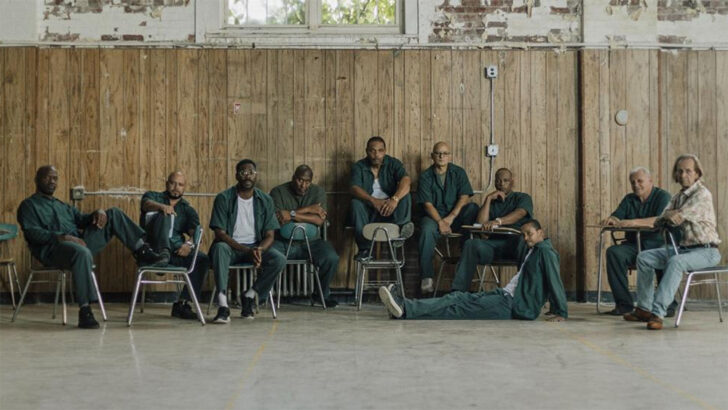A cavalcade of beautiful losers forms a theatre group behind bars in New York in Sing Sing (15). It’s a feelgood that, Divine G (Colman Domingo) informs us in the introduction, deals with the ‘transformative’ power of art.
Is it a good idea for an actor to praise a film before you see it? Is that not telling you what to think of it? And are these people not ‘transformed’ already?
Films about the rehabilitation of prison inmates work better when there’s a backstory showing them at the time when they committed the crimes they’ve been incarcerated for.
The details of such crimes are transmitted to us offscreen here. The affectionate cast of characters seem such benevolent souls, it’s hard to see them doing anything worse than ‘killing a fly on a holy picture’.
I didn’t share the euphoria of most reviewers about this, finding it to be a little too sweet, a little too fond of itself.
It’s an ensemble piece that plays out like ‘Stanislavski behind bars’. Based on a true story, it has Domingo both running and acting in a Rehabilitation Through Theatre programme with his spirited colleagues. They traverse history in an eclectic melange of times and themes.
A Lee Strasberg-style director puts them through their paces, not sparing their blushes when it comes to home truths regarding their thespian chops. Or lack of same.
I felt he was off kilter sometimes. He rails against one of them, ‘Divine Eye’, (Clarence Maclin) for his subdued rendering of the ‘To be or not to Be’ soliloquy from Hamlet, telling him to ‘go large’. But Hamlet was an introvert. It was better the original way.
Maclin is the loose cannon of the group. Things would have been more effective if he stayed like that.
Sing Sing (get the pun?) isn’t so much about prison life as about a set of people who discover the fact that acting out characters’ lives makes them feel better about their own ones.
Fair enough. But we see very little of the actual prison. What we do see doesn’t look like any prison I’ve ever seen. At times it looks more like a holiday camp.
Domingo has a meltdown at one stage of the rehearsals. This is the most realistic scene in the film. He’s subsequently called upon to apologise for it. Why? He’s just come through a grilling interview by an aggressive parole officer which seems to threaten his chances of an early release.
When you’re doing time, especially ‘hard’ time, is it natural to involve yourself year after year in the predicaments of fictional people?
Some of the inmates in the film don’t look like inmates. They look like professional actors. Many of them indeed are – playing themselves.
The relationship between Domingo and Maclin is captured well. The last few scenes between them are particularly evocative. I was relieved to be spared the ‘climactic performance’ trope the film seemed to be heading towards.


 Aubrey Malone
Aubrey Malone Sing Sing (2023)
Sing Sing (2023) 